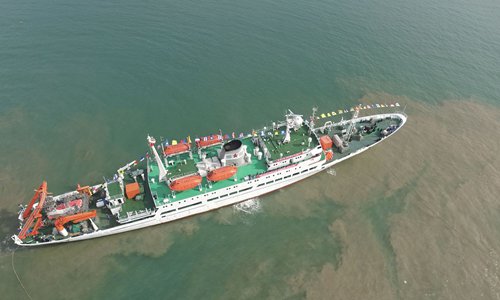
China's deep-sea manned submersible Jiaolong and its crew members arrive at the National Deep Sea Centre of China in Qingdao, a coastal city in East China's Shandong Province on June 23, 2017. (Photo: VCG)
China signed a memorandum of understanding (MOU) with the International Seabed Authority (ISA) on October 18, in accordance with Beijing's mission of sharing its resources and technology in oceanic exploration, as well as assisting developing countries to participate in maritime pursuits. The MOU established the first ever joint training and research center offering free training to aspiring technicians from developing countries.
Under the MOU, China and the ISA will cooperate on promoting knowledge of the deep ocean and enable developing countries to benefit from mineral resources in the international seabed, recognized as the common heritage of humankind. The joint training and research center will be affiliated with the National Deep Sea Centre of China in Qingdao, a coastal city in East China's Shandong Province with high-end marine facilities, and innovative scientific talent.
Free training
The center aims to provide training courses in marine science and technology, the introduction of the latest techniques and access to equipment for deep-sea exploration, as well as marine scientific research designed to facilitate the full participation of developing countries in revealing the international deep seabed area, Li Xiangyang, director of technology and international cooperation department, China Ocean Mineral Resources Research and Development Association, told the Global Times. Relevant international policies and legislation will factor in the process, he added.
"In fact, we have come up the idea about the center since January of 2018 amid the background of China stepping into the center stage in the deep seabed industry. China serves more as a leading power in the global institutions such as ISA which requires us to contribute more and offer the Chinese model to other developing countries," Li told the Global Times. "China is also confident that it will lead the way in setting the rules for a future international deep-sea exploration regime."
The consensus has long been that commercial mining in the deep sea is decades away. Moreover, the US, which has some of the most advanced ocean technology in the world, has not yet ratified the UN Convention on the Law of the Sea, and is thus not a member of the ISA.
China has the ability and responsibility to exchange and transfer its knowledge in marine scientific research to developing countries, which is also one of the principles of the UN Convention on the Law of the Sea, Li said.
He introduced that the center is open to all developing countries and prospective individual trainees can apply for a place through their CV and relevant documents through the official registration channel.
Li said the center will cooperate with both Chinese and international academies to invite more scholars to lecture in the training. The central committee of five to seven members, coming from both China and ISA, will employ a specific training scheme and take responsibility of getting funds from both domestic and international governments and foundations.
The first batch of training for two to three months is expected to be launched in the end of 2020, Li said. "The capability and level of developing countries in deep-sea exploration is uneven, and some countries do not even have research centers, so basic introduction is very needed to enable them learn about the importance of seabed resources. In the future, we are going to look at academic degree awarding as a way to more systematically train people from developing marine countries," he added.
Shared future
"We want the developing countries to participate and not be marginalized. The oceans do not separate the continents of the world, but link them together. As more countries join China's 21st Century Maritime Silk Road of the Belt and Road Initiative, we are confident that China can assist more developing countries to benefit from common marine resources," Liu Feng, general secretary of China Ocean Mineral Resources Research and Development Association, told the Global Times.
China has trained hundreds of maritime personnel from developing countries around the world over the past few years.
"This center will provide a new platform for the ISA to promote capacity-building and the transfer of marine technology for developing countries, and to advance and share human knowledge of the deep ocean and its environment," Michael Lodge, the Secretary-General of the ISA, said on the official signing ceremony held in Beijing, according to the official website of ISA.
The MOU was endorsed by the Assembly of ISA at its 25th annual session of the International Seabed Authority held in July in Kingston, Jamaica, which 168 member-nations participated in.


